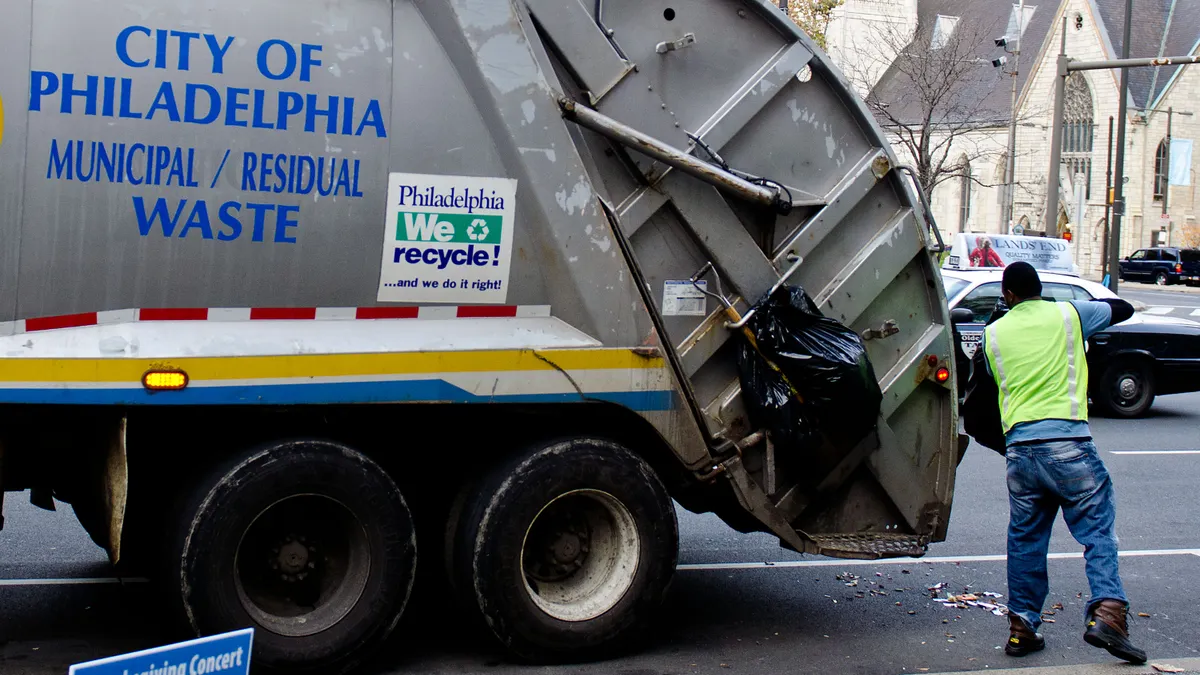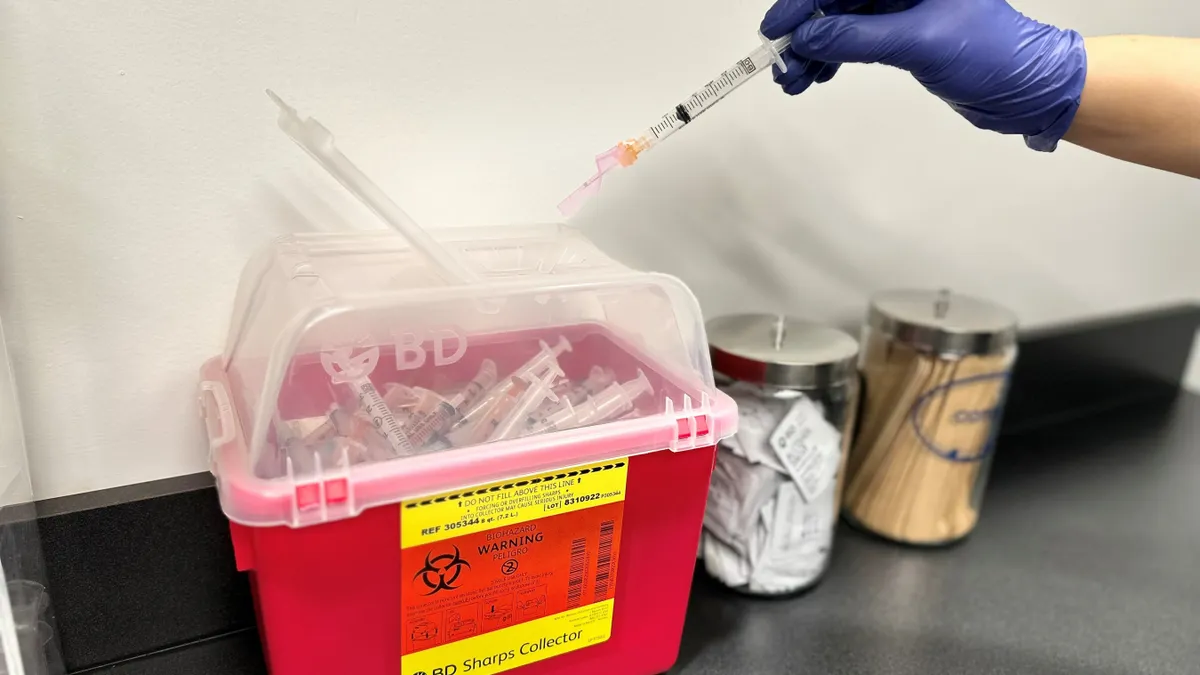The upcoming presidential election could have significant implications for the waste and recycling sector.
While the Biden-Harris administration’s infrastructure and climate investment policies have been a boon to parts of the industry, some of its regulations have also prompted pushback. The modern U.S. waste industry was in large part built on regulations, and major companies often say they can do well in such an environment because it creates new business opportunities. However, some operators feel specific requirements — such as new PFAS or fleet regulations — are too burdensome.
The industry also fared well during the Trump administration, especially due to its corporate tax cuts, until the pandemic affected the economy and drove up inflation. Issues such as recycling markets and food waste received attention from the U.S. EPA under Trump, and that attention could continue in some form if he takes office again.
Whoever is running the next administration will face questions about how to handle materials management strategies in the U.S. and abroad, as well as emissions policies and funding priorities. Such policies will also depend in part on the results of Senate and House elections.
What other topics are important for the next presidential administration to prioritize? Let us know at waste.dive.editors@industrydive.com.
Labor
While the Teamsters declined to endorse either candidate, other notable unions in the industry such as AFSCME and LiUNA went for Harris. Harris has also expressed support for the PRO Act, which would expand certain collective bargaining rights.
Immigration is another key topic in the race with implications for an industry that has long discussed the need to recruit and retain more frontline employees. In addition to differing views on how to enact broader immigration reforms, which has been discussed by industry executives before as a priority, the two candidates also have different stances on the Temporary Protected Status program. During the Trump administration, when parts of the TPS program were under threat, multiple companies spoke about how this could affect their workforce.
The election outcome could also affect a range of other pending labor issues at the federal level. Examples include the joint employer status debate (which has its roots in a waste industry case and= gone back and forth in various administrations), OSHA’s proposed heat standard and more.
Federal grants
The Biden administration has made getting federal funds out the door to environmental projects a priority over the last few years. Many of those funds were allocated under the Infrastructure Investment & Jobs Act of 2021 and the Inflation Reduction Act of 2023. Harris was supportive of both laws and she cast the tie-breaking vote in favor of the latter.
The administration is in the process of awarding funds from the Climate Pollution Reduction Grants program, a multibillion-dollar funding opportunity for states and local jurisdictions. Several jurisdictions plan to develop waste and recycling-related projects as part of that funding opportunity.
Within the infrastructure law, the Solid Waste Infrastructure for Recycling and Recycling Education and Outreach grant are two of the most impactful programs specifically funding waste and recycling projects. Projects funded by those programs so far have encompassed a variety of technologies and facilities, including a solar-powered composting facility, a MRF, a transfer station and numerous organics and recycling collection program improvements.
Trump has blasted President Joe Biden's spending on these issues, and officials from his first administration have argued he could have the power to unilaterally withhold funds. Analyses from law firm Holland & Knight and Columbia University’s Sabin Center for Climate Change Law concluded that Trump could take one of several paths to delaying, pausing or rescinding funding. Project 2025, an initiative published by conservative think tank The Heritage Foundation, has also made defunding the EPA an aim of a second Trump administration. That document is not directly tied to Trump’s campaign, but several former Trump officials helped write it.
Harris, meanwhile, has said she will build on the work the current administration has already done, including the projects financed by the IRA.
Emissions
The Trump administration delayed implementing landfill emissions regulations, tangling an Obama-era update up in court for years. The Biden administration eventually put the updated Clean Air Act regulations into effect in 2021.
The EPA is legally required to update those regulations every eight years, so the Biden administration should have promulgated a new standard this year. The agency said it planned to release a new standard in 2025. That process could be altered by a future Trump-controlled EPA.
Echoing a move he made in 2019, Trump has also vowed to block California’s ability to enforce its plan to transition heavy-duty vehicles — including collection trucks — to zero emissions by 2045.
Biden’s administration has enacted a series of rules designed to hasten the transition of heavy-duty fleets toward zero-emission vehicles. The U.S. EPA’s Phase 3 rule for medium- and heavy-duty vehicle emissions standards, finalized in March, requires refuse haulers to lower their fleets’ carbon intensity by 30% more than previous regulation by 2032.
Another regulation with potentially far-reaching impact, California’s Advanced Clean Fleets rule, is currently awaiting a waiver from the U.S. EPA to go into effect. Advocates for the rule, which sets a more stringent transition timeline than the federal clean trucks rule, have publicly worried Trump could roll back or deny a waiver for the program. Republican state attorneys general have urged the EPA to deny a waiver. The Biden administration has not said when it plans to issue a decision on the waiver.
PFAS
Under the Biden administration, the U.S. EPA has made several notable moves to more strictly regulate certain per- and polyfluoroalkyl substances. That includes setting drinking water standards and designating PFOS and PFOA as hazardous substances under CERCLA. It also updated its guidance on how to destroy or dispose of PFAS-containing items.
A Harris administration could continue the work the EPA is already doing on PFAS, such as advancing recommendations laid out in the agency’s PFAS Strategic Roadmap. The agency says further research and reporting is necessary to learn more about the chemicals and their properties, as well as technologies that could destroy them.
Harris has not directly mentioned waste management aspects of PFAS in her platform, though she has endorsed a bill to help veterans with health issues related to presumed PFAS exposure.
Minnesota Gov. Tim Walz, Harris’ running mate, in 2023 signed into law a significant PFAS ban that covers numerous consumer products. Safer States, a coalition of environmental and health groups that advocate for PFAS regulatory policies, called it one of the “strongest bans in the world.”
A new Trump administration might change the federal government’s approach to these chemicals. The EPA under his administration in 2019 did issue a PFAS action plan, and former Administrator Andrew Wheeler said in a recent interview that his administration was instrumental in “moving forward” with several PFAS-related regulatory steps.
Michael E. Hoffman, CEO of the National Waste & Recycling Association, speculated in a recent interview that a “red” administration may be more open to revising the EPA’s recent PFAS hazardous substance designation than a Democratic administration.
NWRA, along with the Recycled Materials Association, has asked a federal court to review the rule, saying it may negatively affect waste and recycling operators who are “passive receivers” of PFAS-containing items that enter their facilities.
Project 2025 has also called for the next administration to “revisit” the designation of PFAS as hazardous substances under CERCLA.
Recycling and plastics
Both Trump and Biden’s administrations have a track record of signing bills with significant recycling impact. Trump signed Save Our Seas 2.0 in 2020, which provided millions in annual funding through 2025 for plastic recycling investments and cleanup initiatives.
The Biden administration’s Infrastructure Investment and Jobs Act and the Inflation Reduction Act came with millions of dollars in funding for the EPA and other agencies to use for recycling infrastructure, grant programs and environmental justice initiatives.
Other federal recycling bills are still in play, namely a pair of bipartisan bills meant to improve U.S. recycling infrastructure in underserved areas and bolster recycling-related data collection. Those bills haven’t moved forward despite broad recycling industry support.
Under the previous Trump administration, the EPA set a goal to reach a 50% national recycling rate by 2030. Though Trump has not spoken directly about recycling on the campaign trail, he said in August that he would reverse numerous Biden-era climate and energy initiatives, which some environmental groups say could have implications for recycling efforts.
If elected, Harris is largely expected to reflect the Biden administration’s recycling-related policies. The Biden administration announced in July a detailed plastic pollution reduction plan it says is the first time the federal government has “formally acknowledg[ed] the severity of the plastic pollution crisis.” It also called for phasing out single-use plastics from federal operations by 2035.
The Biden administration has also spoken in favor of the plastics reduction measures listed in the proposed international plastics treaty, which some Republican lawmakers oppose.
Environmental justice
The Biden administration has made environmental justice a major part of its platform through numerous new initiatives.
It created the Office of Environmental Justice and External Civil Rights to make environmental justice a permanent facet of the EPA’s work. It also established the Justice40 initiative and EJ Action Plan, and dedicated funding specifically for environmental justice grants from the infrastructure law.
A Harris administration is expected to continue such efforts. Harris has discussed environmental justice issues during campaign stops and throughout her time as vice president. She previously supported environmental justice efforts as California’s attorney general and as a senator. During her presidential campaign, she has received endorsements from notable groups such as the Southern Poverty Law Center.
As president, Trump is not expected to make the issue a priority. During his previous term, he supported policies that some groups say have harmed environmental justice communities, such as reversing regulations and deprioritizing or criticizing climate change initiatives. Project 2025 specifically calls to “eliminate” the Office of Environmental Justice and External Civil Rights.


















